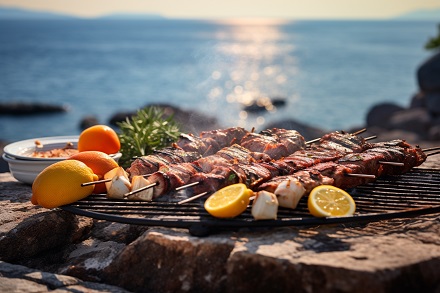The Timeless Influence of Ancient Food: Unveiling the Culinary and Cultural Legacy
The article explores the cultural significance of food in ancient civilizations, including ancient agricultural practices, culinary traditions and recipes, food as a reflection of cultural identity, importance of food in religious and social ceremonies, food symbolism and rituals, nutrition and health in ancient civilizations, influence of ancient food on modern cuisine, hygiene practices and food preparation, and the lasting legacy of ancient food practices.

The Cultural Significance of Ancient Food in Civilizations
The cultural significance of food in ancient civilizations is a reflection of the deep-rooted connections between dietary practices, societal customs, and spiritual beliefs. These ancient societies primarily cultivated staple foods such as whole wheat bread, beans, barley, cereals, vegetables, fruits, and maize as the cornerstone of their dietary practices.
For instance, the Inca civilization sculpted the landscape for high-yield terracing and storage houses, showcasing advanced agricultural practices that were integral to their societal development and cultural identity. Additionally, rice held significant cultural and religious importance in ancient Japan, with its own national and local gods, emphasizing the profound connection between agriculture and cultural beliefs in ancient civilizations.
The agricultural and livestock-based cultures of ancient civilizations significantly influenced their dietary and cultural practices, shaping their culinary traditions and societal structures [4].
Ancient civilizations were divided into agricultural and livestock-based cultures, influencing their dietary and cultural practices, including food preparation and hygiene. The division between these cultures impacted not only their dietary choices but also their day-to-day lives and societal structures. For example, the agricultural practices of the Inca civilization, focusing on high-yield terracing and storage houses, not only ensured food security but also contributed to the cultural identity of the society. The division between agricultural and livestock-based cultures also shaped the culinary traditions and dietary practices, leading to diverse and region-specific food customs that continue to influence modern gastronomy.
Ancient Mediterranean meals
were characterized by the inclusion of cereals, vegetables, fruit, olive oil, fish, and meat, reflecting the diverse culinary traditions of the region and their enduring influence on modern cuisine. The culinary traditions of the ancient Mediterranean civilizations not only shaped their dietary practices but also left a lasting impact on the development of culinary customs and regional gastronomy.
For example, the spread of ancient Mediterranean cuisines by Phoenicians, Greeks, and Romans to different regions influenced the culinary identities of diverse cultures, highlighting the enduring legacy of ancient culinary traditions. Furthermore, the incorporation of diverse ingredients and cooking methods in ancient Mediterranean meals showcased the rich and varied culinary heritage of the region, influencing modern-day culinary practices and gastronomic preferences.
Maize, a staple in Mesoamerica, held both cultural and nutritional significance, as it was associated with its own god, demonstrating the deep-rooted connection between food and spirituality in ancient civilizations. The cultural and nutritional significance of maize in Mesoamerican ancient civilizations is exemplified by its representation in religious beliefs and dietary practices.
For instance, the association of maize with its own god not only underscored its cultural importance but also highlighted the role of maize as a staple food that sustained the nutritional needs of the society. Additionally, the cooking methods and culinary techniques used for maize in Mesoamerica reflected the cultural significance of food preparation and the enduring influence of ancient culinary practices on modern dietary preferences.
Traditional Egyptian foods
such as Koshary and Molokhia continue to be consumed in present-day Egypt, adapted with different ingredients and recipes, demonstrating the longevity of culinary traditions [3]. The continuation of traditional Egyptian foods in modern cuisine is a testament to the enduring influence of ancient culinary practices on contemporary gastronomy. For example, the adaptation of ancient Egyptian recipes and ingredients in present-day Egyptian dishes reflects the cultural resilience and lasting impact of ancient culinary traditions on modern dietary customs.
Furthermore, the widespread consumption of traditional Egyptian foods in modern Egypt underscores the deep-rooted connection between ancient culinary heritage and contemporary gastronomic preferences, enriching the culinary landscape with diverse flavors and culinary techniques.
The prohibition of pork consumption in Egypt and the enduring influence of prepared cuisine from ancient Greeks and Romans further highlight the cultural and religious impact of ancient food practices on modern dietary preferences and culinary traditions.
The dietary restrictions and culinary customs influenced by ancient civilizations continue to shape contemporary gastronomy and reflect the enduring legacy of historical dietary practices on modern culinary identities. For instance, the prohibition of pork consumption in ancient Egypt not only influenced the dietary customs of subsequent cultures, such as Judaism and Islam, but also underscored the enduring impact of ancient religious and cultural beliefs on modern dietary restrictions.
Additionally, the culinary techniques and flavor profiles introduced by ancient Greeks and Romans continue to influence modern culinary traditions, enriching the gastronomic landscape with diverse and enduring culinary practices.
Ancient civilizations
had a good understanding of nutrition, focusing on a balanced diet comprising fruits, vegetables, grains, dairy, meat, and fish for overall well-being. The holistic understanding of nutrition in ancient civilizations not only influenced their dietary practices but also shaped their approach to overall well-being and health. For example, the emphasis on a balanced diet that incorporated a variety of food groups highlighted the interconnectedness of dietary choices and physical well-being in ancient societies. Furthermore, the use of herbs and spices for flavor and medicinal purposes underscored the multifaceted role of food in promoting holistic health and well-being in ancient civilizations, providing valuable insights into their approach to nutrition and overall vitality.
The enduring influence of ancient food practices on modern cuisine is evident through the continuation of traditional Egyptian foods in present-day Egypt, adapted with different ingredients and recipes. The continuation of ancient culinary traditions in modern cuisine reflects the enduring impact of historical gastronomic practices on contemporary dietary customs. For instance, the adaptation of ancient recipes and ingredients in modern Egyptian dishes not only highlights the cultural resilience of ancient culinary traditions but also enriches the culinary landscape with diverse flavors and culinary techniques that have stood the test of time. Furthermore, the enduring influence of ancient Mediterranean meals on the development of modern Mediterranean cuisine underscores the lasting imprint of ancient culinary traditions on contemporary gastronomy. The profound influence of ancient culinary practices on modern cuisine enriches the culinary heritage with diverse flavors and enduring culinary techniques that continue to shape contemporary gastronomy.
The importance of food preparation and hygiene in ancient civilizations shaped their dietary practices and cultural customs, including food preparation and hygiene. The significance of food preparation and hygiene in ancient civilizations not only ensured the safety and quality of food but also reflected the cultural and societal values associated with culinary practices. For example, the use of natron as soap, circumcision, and grooming practices in ancient Egypt underscored the cultural and religious significance of hygiene in dietary customs and societal traditions. Additionally, the influence of Greek and Roman cuisine on food preparation and hygiene practices across diverse cultures highlighted the enduring impact of ancient culinary traditions on contemporary culinary customs and standards. The enduring legacy of ancient food practices continues to shape modern culinary traditions and reflects the profound and lasting impact of ancient civilizations on culinary customs and societal practices.
The enduring impact of historical gastronomic traditions on modern dietary practices and challenges underscores the profound influence of ancient civilizations on culinary traditions and societal customs. For example, despite the loss of achievements in food and agriculture during the Dark Ages, ancient food practices continue to shape contemporary gastronomy, reflecting the enduring impact of historical events on modern dietary practices and challenges. The insights provided by the Nineteenth Dynasty of New Kingdom Egypt offer valuable perspectives into the enduring legacy of ancient food practices, enriching our understanding of the cultural and historical significance of ancient dietary customs.
The cultural significance of food in ancient civilizations continues to resonate in modern cuisine, reflecting the enduring influence of historical gastronomic traditions. To explore the vibrant flavors and techniques of Greek cuisine, visit Cooking With Greek People and discover the rich heritage of ancient culinary traditions.
[1] https://www.worldhistory.org/collection/35/food-in-the-ancient-world https://www.quora.com/How-well-did-past-ancient-civilizations-understand-nutrition https://journalofethnicfoods.biomedcentral.com/articles/10.1186/s42779-023-00177-4 https://ancientcivilizationsworld.com/food
